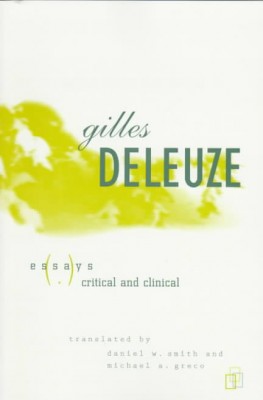| Gilles Deleuze: Essays Critical and Clinical Contributor(s): Deleuze, Gilles (Author) |
|
 |
ISBN: 0816625697 ISBN-13: 9780816625697 Publisher: University of Minnesota Press OUR PRICE: $25.25 Product Type: Paperback - Other Formats Published: November 1997 Annotation: The final work of the late philosopher Gilles Deleuze (1925-1995) includes essays on such diverse literary figures as Herman Melville, Walt Whitman, D.H. Lawrence, Lewis Carroll, and others, along with philosophers Plato, Spinoza, Kant, and others. Taken together, these 18 essays--all newly revised or published here for the first time--present a profoundly new approach to literature. |
| Additional Information |
| BISAC Categories: - Philosophy | History & Surveys - Modern |
| Dewey: 809 |
| LCCN: 97-13300 |
| Physical Information: 0.55" H x 5.96" W x 9" (0.80 lbs) 280 pages |
| Descriptions, Reviews, Etc. |
| Publisher Description: Essays Critical and Clinical was the final work of the late Gilles Deleuze, one of the most important and vital figures in contemporary philosophy. It includes essays, all newly revised or published here for the first time, on such diverse literary figures as Herman Melville, Wait Whitman, D. H. Lawrence, T. E. Lawrence, Samuel Beckett, Leopold von Sacher-Masoch, Alfred Jarry, and Lewis Carroll, as well as philosophers such as Plato, Spinoza, Kant, Nietzsche, and Heidegger. For Deleuze, every literary work implies a way of living, a form of life, and must be evaluated not only critically but also clinically. As Proust said, great writers invent a new language within language, but in such a way that language in its entirety is pushed to its limit or its own "outside". This outside of language is made up of affects and percepts that are not linguistic, but which language alone nonetheless makes possible. In Essays Critical and Clinical, Deleuze is concerned with the delirium -- the process of Life -- that lies behind this invention, as well as the loss that occurs, the silence that follows, when this delirium becomes a clinical state. Taken together, these eighteen essays present a profoundly new approach to literature by one of the greatest twentieth-century philosophers. |